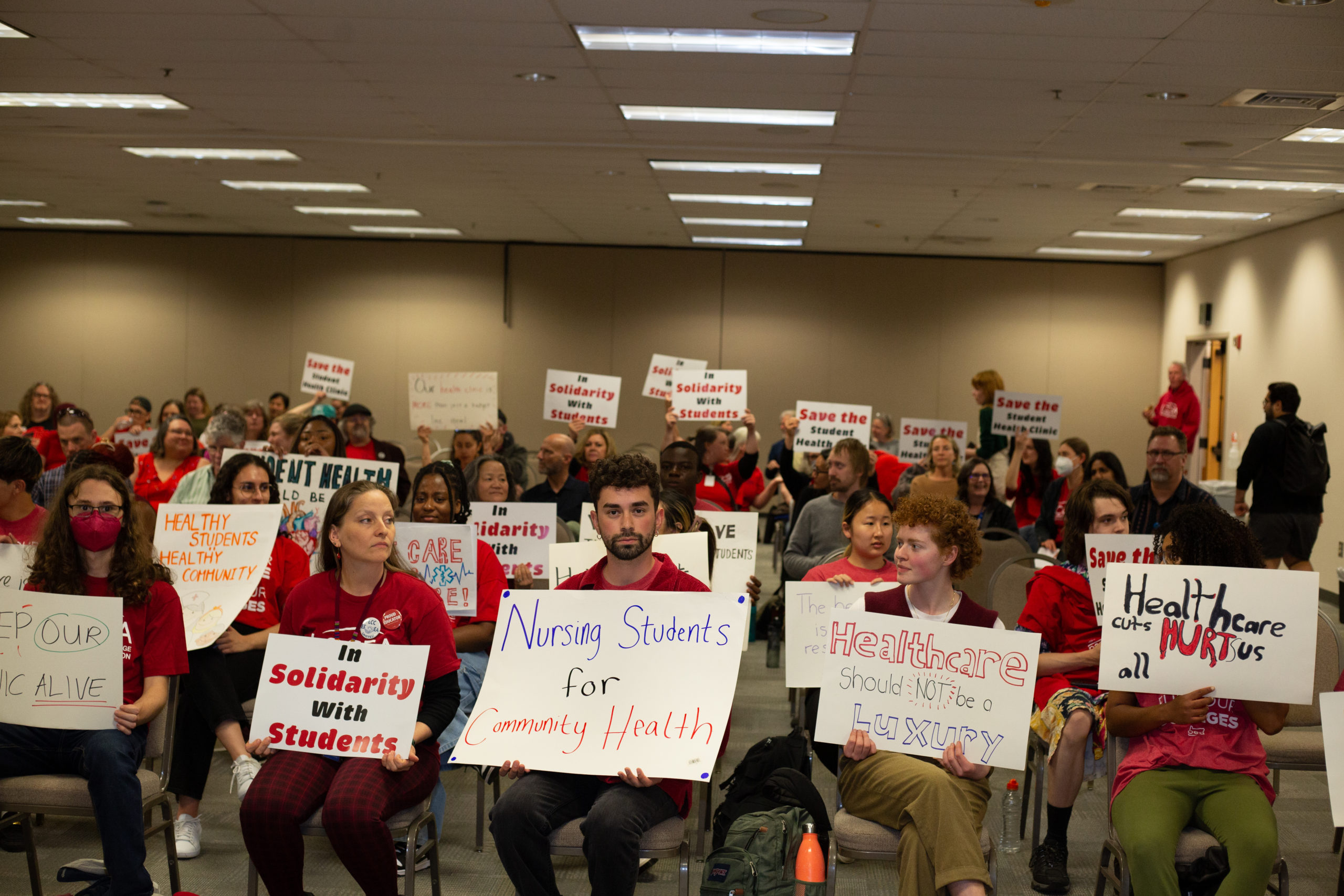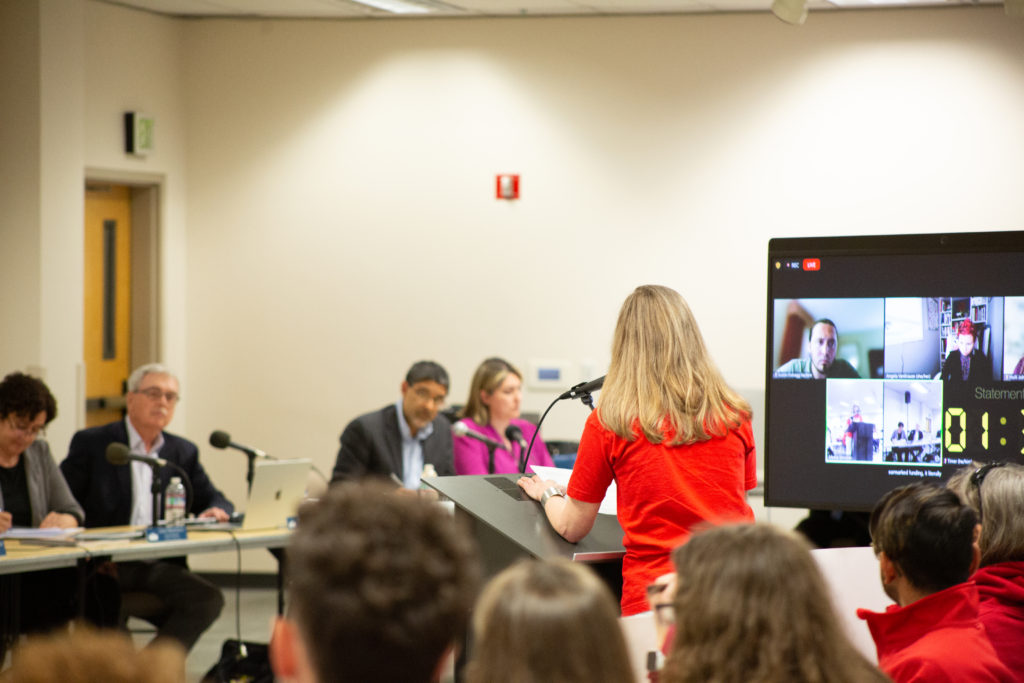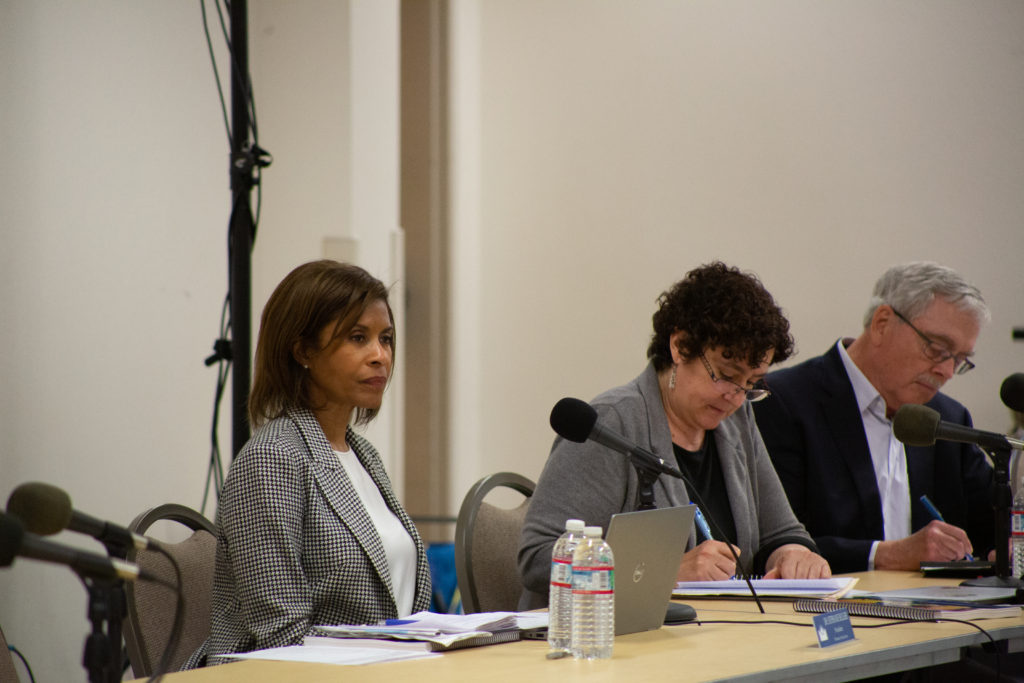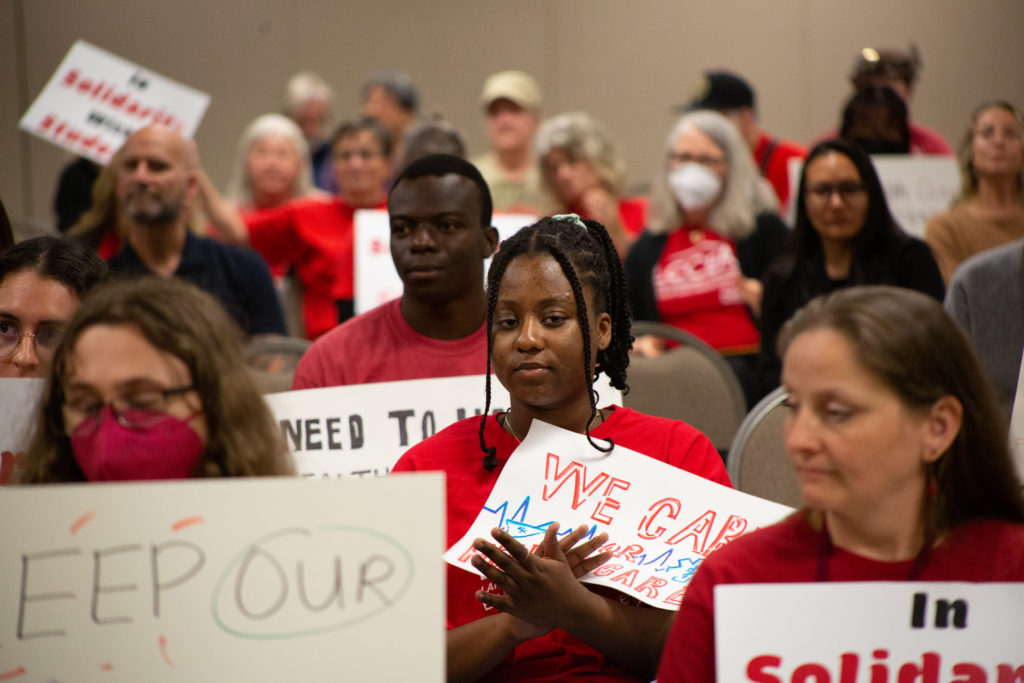
On Wednesday May 3, students and faculty gathered to express support for the LCC Health Clinic. Photos by Kyle Solomons.
The Lane Community College Employee Federation had their rally protesting against the controversial choice to phase out the health clinic by this fall. The rally led the protesters to the board meeting which took place on May 3rd at 6:00 p.m. Students and faculty walked in solidarity with signs held high sitting together preparing to speak out against the closure.
The board members at the meeting were Mike Eyster, Austin Folagy, Lisa Fragala, Holli Johnson, Steve Mital, Angela VanKrause. When the meeting began the board made it crystal clear that they fully intended to allow everyone to speak saying, “we really want to do our best to honor everybody’s opportunity to have their say.”
One of the many speakers from the rally was Cathy Faber, nurse practitioner at the Health Clinic. Faber explains that students need more than attending class to be successful at college and students may have difficulties with finances, relationships, health concerns, housing or food insecurities. Faber has seen first hand that students having their basic needs met allows them to be more successful in college life.
Faber puts listeners into the shoes of somebody thousands of miles away from home without friends or family around feeling overwhelmed and anxious, unable to talk to your parents in fear of making them worry. Faber sees this all the time and works with students to get through these problems through mental health and wellness therapists, tutoring, referrals to Center for Accessible Resources, and sometimes medication support. Specifically Faber points out that an international student far from home in a vastly different time zone could make it difficult to consult with family members. Because of that, the clinic tends to be the first stop for many international students where they can get assistance with understanding the complex health system in the US. Overall Faber wants students to know that they are here and wish to support students and build bonds with them whilst they get their education.

Another speaker in support of the Health Clinic is Hina Tamura, an international student from Japan. Tamura is also a senator at the Student Government Association, and a peer Mentor at the international program.
To Tamura the health clinic has been a valuable resource to her as she was not familiar with medical services in the Eugene area. The Health Clinic is covered by international insurance so it’s the first option for any international students attending LCC. Tamura fears that removing the Lane Health Clinic will significantly impact Lane students academically as they will lose a convenient and close-by place where they can easily receive medical services.
Another international student, student body president Nikhar Ramlakhan, also spoke out against the closure of the Health Clinic as health was a priority as a bone cancer survivor. The Health Clinic on campus was a huge factor in traveling 10,000 miles away from his home in South Africa giving relief to him and his family. However Ramlakhan sustained a minor injury during his first month limiting his movement. After working with the Health Clinic Ramlakhan was surprised how quick and easy it was to not just schedule an appointment but get treatment the same day. “The nurses and staff were super friendly and delivered world class service and gave me a treatment plan that allowed me to make a full recovery.”
Ramlakhan was confident that the health clinic would be able to help him when he needed it and recommended the board to take in consideration how the health clinic contributes to student success.

After the public testimony concluded the board moved forward with the, “President’s report”
According to the report the legislative budget amount for community colleges is 2% to 2.5% below the current state service level, and all indications are that it’s going to be tough to remain, given the legislative budget numbers we have seen thus far. In fact, we are preparing ourselves for a revenue forecast that could result in even less revenue than we have been advocating for to receive.”
The board believes that the Health Clinic is not financially sustainable, arguing that it doesn’t fully serve the student body and their new proposal is intended to serve thousands of students, “Instead of serving approximately 200 students, the number who were served in the health clinic in fall 2022, the proposal is to serve thousands of students with affordable access to health care services.”
The report concluded with assurance that this proposal is a way to provide affordable healthcare for students and their families. “One of Lane’s treasured values is accessibility, which means minimizing financial, geographical, environmental, social, and holistic, and cultural barriers to learning. For reasons of access and mechanics, offering more students greater access to health care services at the lowest cost possible would be a prudent course of action”
The reaction to the attendees was primarily negative with many voicing their displeasure before moving forward.

The board then went to the main discussion regarding the health clinic specifically, “The proposal for a different mode of service.”
According to the board, in fall 2022 the clinic served 217 students. Approximately 65% of on-campus students pay $45 per term for that service.
Those patients represent 6% of the total student population which the board stated, “What you heard tonight was a very acute need among our students. Its very high needs students. They are a very small population of all the rest of the students.”
The main issue the board has is that the current model, “is (that the health clinic) is not benefitting the majority of students.” However the board recognizes the service is, “a very important service for those students who need it. Vulnerable students, international students who so eloquently spoke today.”
The first scenario proposed by the board is to divert funds of $260,000 in practice billing per year to support the health clinic The board noted this is a viable alternative but not “fiscally sound at this point in time.”
The second solution is to increase the fee from $45 to $52 and to apply it to all credit students. The council notes that it’s essentially requiring everyone to pay, noting again, “this is really a very small number of students who are actually using the service on campus.”
The third solution considered was maintaining the current model and adding virtual care which would increase the fee to $75.
The fourth scenario is to develop a “combined model of an on campus coordinated public health initiatives and referrals.”
“This is what our sister community college was doing and they were meeting their students’ needs and adding on a virtual plan for all students and their dependents, regardless of their enrollment,” The board said.
The board states that this would include establishing a fee to all students of approximately $45 per year which would decrease the campus expenditures by $600,000. The idea is to redevelop the model with “coordination with other providers,” with an added virtual care component.

